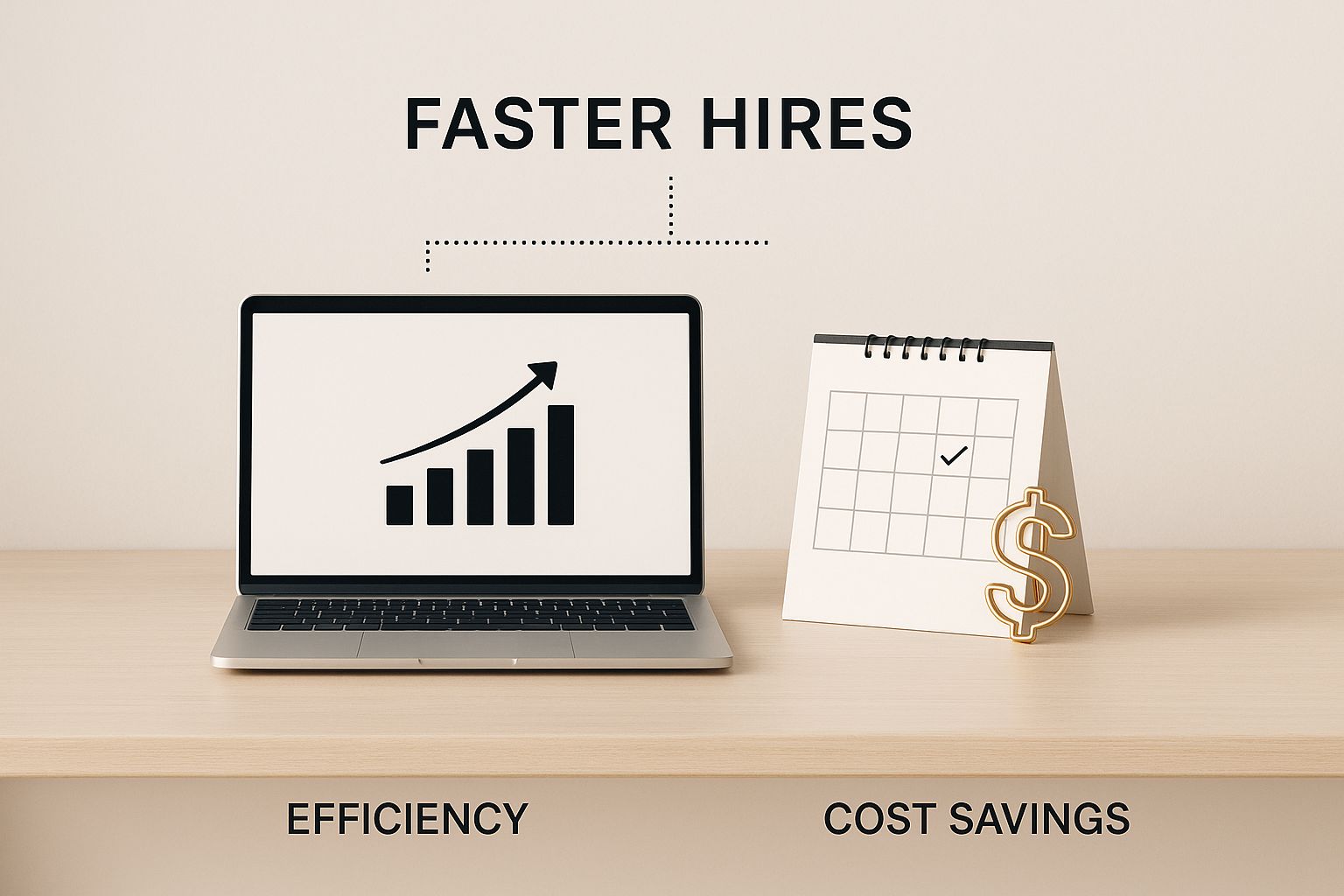August 5, 2025
What is Recruitment Outsourcing? Benefits & Strategies

Recruitment outsourcing is when a company hands over some, or all, of its permanent hiring process to an external expert. But don't think of them as just a temporary fix. They're a fully integrated partner who manages the whole talent acquisition journey, becoming a true extension of your own HR team.
Understanding Recruitment Outsourcing

Let’s use an analogy. When you build a house, you don't go out and hire the plumber, the electrician, and the carpenter separately. You hire a general contractor—a single, trusted expert who coordinates everything and everyone to bring your vision to life. That’s exactly what recruitment outsourcing, more formally known as Recruitment Process Outsourcing (RPO), does for your hiring.
This isn't about just plugging holes in your headcount. It's a deep partnership where a specialized firm takes ownership of your entire recruitment lifecycle. This is a world away from a typical staffing agency. An agency usually works on a one-off, transactional basis to fill a specific role. An RPO provider, on the other hand, is in it for the long haul, focused on improving your entire talent strategy.
More Than Just Filling Roles
A true RPO provider immerses themselves in your business. They learn your culture, adopt your values, and align with your long-term goals. Their success is tied directly to yours. Because of this deep integration, they become genuine brand ambassadors, ensuring every candidate has a positive and consistent experience that reflects well on your company.
Their work is both comprehensive and strategic. It often covers:
- Candidate Sourcing and Screening: Proactively finding and vetting potential hires.
- Interview Coordination: Handling all the logistics of scheduling and conducting interviews.
- Offer Management: Managing negotiations and extending formal job offers.
- Onboarding Support: Helping new employees make a smooth transition into the company.
- Technology Management: Implementing and running recruitment tech like an Applicant Tracking System (ATS).
The whole point of RPO is to shift from a reactive, transactional hiring model to a proactive, strategic one. It’s about building a sustainable talent pipeline to fuel future growth, not just scrambling to fix today's staffing shortages.
A Quick Look at Different Recruiting Models
To really get what makes RPO unique, it helps to compare it to other common ways companies hire. Each model has its place, and the right one for you depends entirely on your company's needs, size, and goals.
This table breaks down the key differences between having your own in-house team, using a traditional staffing agency, and partnering with an RPO provider.
As you can see, RPO operates on a fundamentally different level, moving beyond simple placements to become a core part of your business strategy.
Exploring Different RPO Models
Recruitment outsourcing isn't a one-size-fits-all service. It comes in a few distinct flavors, each designed to tackle different business challenges. Picking the right model is a bit like choosing the right tool for a job—you wouldn’t use a sledgehammer to hang a picture frame, and you wouldn't rely on a tiny hammer to break down a wall.
The right choice really boils down to the scale and timeline of your hiring needs. By understanding the main options—Enterprise, Project-Based, and On-Demand—you can find a partner that truly aligns with your company's goals. Each one brings a different level of integration and commitment to the table.
This infographic gives a great visual breakdown of how a good RPO partnership translates into real-world business wins, like hiring faster and saving money.

As you can see, the right model has a direct impact on the metrics that matter, helping your company run more efficiently and improve its bottom line.
Enterprise RPO
Think of Enterprise RPO as the all-in-one, comprehensive solution. When you go this route, you’re handing over your entire permanent hiring function to a single provider for the long haul. Your RPO partner essentially becomes your company's talent acquisition department, just an external one.
This is the perfect fit for larger organizations that have consistent, high-volume hiring demands. It's built for companies that want to standardize their recruiting processes, boost the quality of their hires, and gain a strategic edge across the entire business. It’s a deep, committed partnership focused on getting better and better over time.
Project-Based RPO
Project-Based RPO is all about tackling a specific, time-sensitive hiring goal. Let's say you're opening a new factory and need to hire 100 skilled technicians in the next six months. Instead of overwhelming your internal team, you can bring in a project RPO provider to manage that specific hiring push from start to finish.
This model has become incredibly popular for its targeted expertise without the long-term contract. In fact, project-based models are growing rapidly, expanding at a CAGR of 15.9% because they offer so much more flexibility than traditional enterprise deals. For a deeper dive, check out this report on recruitment outsourcing trends.
On-Demand RPO
Finally, there’s On-Demand RPO, which offers the ultimate flexibility. This model is like a tap you can turn on and off, giving you recruiting resources exactly when you need them. You might just need one or two expert recruiters for a few months to help your team handle an unexpected spike in open roles.
This approach is perfect for companies that need scalable support without a fixed commitment. It provides access to expert recruiters who can quickly integrate, tackle specific sourcing challenges, and then cycle off once the need subsides.
Each of these models uses different candidate sourcing strategies, from broad employer branding campaigns in an Enterprise setup to hyper-focused outreach for a Project RPO. No matter which you choose, the goal is always the same: to give your business the exact support it needs to hit its hiring targets.
The Real Benefits of an RPO Partnership
When you partner with a recruitment process outsourcing provider, you're doing a lot more than just handing off the task of filling empty seats. The real magic lies in the strategic ripple effects that touch everything from your bottom line to your company's ability to scale. By letting experts handle the day-to-day grind of hiring, you free up incredible amounts of energy and resources to push your core business forward.
The first thing most companies notice is the impact on their budget. It's often a significant one. RPO providers work at a scale that's tough for a single company to achieve on its own. They have established networks and sophisticated tech that makes the entire hiring process more efficient, which directly lowers your cost-per-hire. Think of all the money spent on multiple job board subscriptions, ad campaigns, and the often-overlooked costs of letting a key role sit vacant for too long.
Raising the Bar on Talent Quality and Hiring Speed
Saving money is great, but the quality of your team is what ultimately fuels growth. This is where an RPO really shines. Their recruiters aren't generalists; they're specialists who live and breathe their specific industries. They have deep connections and know exactly how to find and engage passive talent—those top performers who aren't even looking for a job but are perfect for your team.
An RPO partner does more than just scan for keywords on a resume. They dive deep, using advanced screening techniques to find people who not only have the right skills but are also a fantastic fit for your company culture. This leads to hires who stick around and thrive.
This level of expertise naturally speeds things up. A good RPO operates like a well-oiled machine, dramatically cutting down your time-to-hire. They handle all the moving parts, from the first contact to the final offer, keeping the momentum going and ensuring great candidates don't lose interest. By refining your internal systems, you can build a more effective hiring engine. For actionable advice on this, check out our guide on how to improve the recruitment process.
Gaining a Strategic and Scalable Edge
Beyond filling specific roles, an RPO partnership offers powerful advantages that align directly with your long-term business strategy. Here are a few key benefits:
- Effortless Scalability: Need to hire a whole team for a new project or slow down hiring for a quarter? An RPO can flex its resources up or down almost instantly, giving you an agility your fixed in-house team simply can't match.
- Access to Premier Technology: RPO firms sink major capital into the best recruiting tech, from powerful Applicant Tracking Systems (ATS) to AI-driven sourcing tools. You get the benefit of a top-tier tech stack without the massive investment.
- Sharpened Focus on Your Core Mission: When you have specialists managing talent acquisition, your leaders and HR team can finally stop putting out hiring fires. Instead, they can focus on what truly matters: driving innovation, developing your people, and hitting your most important business goals.
The market numbers tell the same story. The RPO industry is currently valued at around $7 billion and is projected to hit $8.14 billion in the next year alone. This surge isn't just a trend; it’s a direct response to a global demand for specialized talent and a universal business need to focus on what makes a company great.
How Technology Powers Modern RPO

When you partner with an RPO provider today, you’re not just getting extra hands on deck. You’re tapping into a sophisticated technology stack that would be incredibly expensive and time-consuming to build from scratch. Modern RPO is far from a simple service; it’s a data-driven strategic function powered by a digital engine. This is what makes the whole process faster, smarter, and more effective.
The centerpiece of this tech stack is usually an AI-driven Applicant Tracking System (ATS). Think about your team getting swamped with thousands of resumes for just one job opening. An AI-powered ATS can sift through all of them in minutes. It pinpoints the top candidates based on skills, experience, and even subtle indicators of a good cultural fit, letting your recruiters focus on what they do best: building relationships with promising talent.
Smart Tools for Every Hiring Stage
Technology doesn’t just stop at the initial screening. It refines every single step of the recruitment journey. RPO providers bring a whole suite of specialized tools to the table, creating a smooth, professional experience for everyone involved—from your hiring managers to the candidates themselves.
These tools often include:
- Predictive Analytics: By digging into historical hiring data, these platforms can forecast which candidates have the highest probability of success in a specific role. They can also tell you which sourcing channels are actually giving you the best bang for your buck.
- Automated Scheduling: Gone are the days of endless email back-and-forth just to find an interview time. Smart calendars sync up automatically, letting candidates pick a slot that works for everyone and cutting out the administrative headache.
- Video Interview Platforms: First-round interviews can happen on the candidate's schedule through pre-recorded video submissions. This gives recruiters the ability to review more candidates in less time while offering applicants much-needed flexibility.
This tech-centric approach means the hiring process isn't just efficient; it's also built on a foundation of solid data. If you're curious about this, you might find our guide on how to use AI in recruiting helpful.
Technology in RPO acts as a force multiplier. It automates the repetitive, time-consuming tasks so that human expertise can be applied where it matters most: engaging top talent and making insightful hiring decisions.
Top-tier RPO providers now weave artificial intelligence and machine learning into their core functions, automating tasks like resume screening and interview scheduling to dramatically boost efficiency. The integration of chatbots and automated assessment tools also elevates the candidate experience, making the entire hiring process feel seamless. It's clear that AI is a major driver in modernizing everything from sourcing and diversity hiring to strategic workforce planning.
Choosing the Right RPO Partner
Picking an RPO provider isn't just about hiring a vendor; it's a major business decision that feels more like bringing on a long-term strategic partner. You have to look past the slick sales presentations and dig into the factors that actually lead to a successful relationship.
The right partner should feel like a natural extension of your own team. They'll be the ones driving your talent strategy forward, so you need a high degree of trust, transparency, and shared expertise from day one.
A great place to start your evaluation is with industry-specific experience. Does the provider truly get the unique challenges, compliance hurdles, and talent pools in your sector? A partner with a solid track record in your field won't be starting from scratch—they'll come to the table with established candidate networks and sourcing strategies that have already been proven to work. This alone can save you an incredible amount of time and money.
After that, you need to think about cultural alignment. These recruiters will be representing your company, so how they operate matters—a lot.
Evaluating Key Competencies
The best RPO providers act as transparent partners, not as mysterious, black-box vendors. A huge part of your vetting process is making sure their capabilities line up with your business goals. When you're talking to potential partners, don't be afraid to ask direct, pointed questions about their processes and the technology they use.
Here’s a simple checklist to guide those conversations:
- Technology Stack: What specific Applicant Tracking System (ATS) and other recruitment tools do they use? More importantly, ask them to explain exactly how these tools make the process more efficient and improve the candidate experience.
- Performance Analytics: How do they measure success? Ask to see sample reports on essential KPIs like time-to-hire, cost-per-hire, and quality of hire. You need to know what their reporting looks like and how they track progress toward your goals.
- Team and Cultural Fit: Who, specifically, will be on your dedicated account team? Get to know them. These recruiters will be the face of your employer brand, so it’s critical that they understand and can genuinely represent your company's culture and values.
The goal is to find a partner whose team can blend in seamlessly with yours. They shouldn't just understand your business; they should become champions of its values throughout every step of the recruitment journey.
Finally, always ask for detailed case studies and, most importantly, references from current clients. Try to speak with companies in your industry. Hearing directly from another business leader about their real-world experience offers a level of insight that a sales pitch simply can't provide. This due diligence is what separates a good choice from a great one and ensures you pick a partner who is truly equipped to deliver.
Here's the rewritten section, designed to sound like an experienced human expert.
Making Your RPO Partnership Work from Day One
Getting an RPO partnership right doesn't happen by accident. The real magic, and the hard work, begins during the implementation phase. Think of it less as a simple handover and more as building the very foundation of a long-term, successful relationship. If you treat this transition period as a critical project in its own right, you're already on the path to getting the results you want.
So, where do you start? The very first conversation should be about defining what "success" actually looks like for you. Before a single job is posted, you and your new RPO partner need to sit down and agree on the specific Key Performance Indicators (KPIs) you'll track. Are you aiming to slash your time-to-hire? Boost the quality of candidates walking through the door? Or maybe you have a laser-focus on hitting a certain cost-per-hire number? Without these benchmarks, you're just flying blind.
Getting Everyone on the Same Team
Once the goals are set, you need to turn your attention inward. You absolutely have to get buy-in from your internal team, especially the hiring managers. They're the ones who will be interacting with the RPO provider daily, so their support isn't just nice to have—it's essential. Kick things off with a formal meeting to introduce everyone, clearly outline who is responsible for what, and set the ground rules for how you'll all work together.
A great implementation is a joint effort built on careful planning and transparent communication. It's about aligning two teams to function as one cohesive unit with a shared objective.
To keep that alignment strong, you need a steady rhythm of communication. This isn't about endless meetings; it's about purposeful check-ins. Here’s a simple but effective framework:
- Weekly Check-ins: These are your tactical huddles. Use them to share quick updates and knock down any immediate roadblocks.
- Monthly Performance Reviews: A chance to step back and look at the data. How are you tracking against those KPIs you set?
- Quarterly Business Reviews (QBRs): This is your high-level strategy session. It's where you'll review the bigger picture and make adjustments to the plan for the coming months.
Finally, don't forget to manage the change across the entire company. People get nervous when they don't know what's going on. Be proactive and communicate the "why" behind this new partnership. Explain the benefits everyone will see, from faster hiring to better colleagues. This transparency goes a long way in preventing confusion, minimizing resistance, and setting your new RPO partnership up for a win.
Common Questions About Recruitment Outsourcing
Even after getting familiar with the different models and benefits, some key questions always pop up when a business starts to seriously think about what recruitment outsourcing could look like for them. Let's tackle those head-on.
Think of this as the final Q&A session before you decide on a new direction. We'll clear up any lingering doubts with some straight, practical answers.
Is Recruitment Outsourcing Only for Large Companies?
That's a common misconception, but the short answer is no. While big corporations definitely use full-scale RPO solutions, the beauty of today's models is their flexibility, making them a fantastic option for businesses of all sizes. It all comes down to picking the right model for what you need right now.
For small and medium-sized businesses (SMBs), more targeted approaches are often a perfect fit:
- Project-Based RPO: A startup launching a new product needs to hire a 15-person sales team fast. This is the ideal solution.
- On-Demand RPO: A mid-sized company with a two-person HR team suddenly has a spike in hiring needs. On-demand support can step in and manage the overflow.
These models give smaller companies access to world-class recruiting tools and expertise without locking them into a massive, long-term contract.
Will We Lose Control Over Our Hiring Process?
This is probably the biggest worry we hear, and it comes from a misunderstanding of what a true RPO partnership is. You aren't handing over the keys and walking away; you're delegating the heavy lifting. A good RPO provider is your expert co-pilot, not a new pilot who hijacks the plane.
A great partnership is built on collaboration. You’re still in the driver's seat. You set the strategy, define the culture, and make every single final hiring decision. Your RPO partner simply runs the process to bring you the best candidates, all based on your rules.
They work to bring your vision to life, arming you with the data, market intelligence, and operational horsepower to make smarter, more confident choices. The control is, and always should be, yours.
How Is RPO Different from a Staffing Agency?
The core difference is strategy versus transaction. A staffing agency is all about the transaction—their job is to fill an open role as quickly as possible, get paid, and move on. They're a great resource for plugging an immediate, one-off gap.
Recruitment process outsourcing, on the other hand, is a deep, long-term partnership. The provider takes ownership of your entire recruiting function, from building your employer brand and sourcing candidates to screening and onboarding. Their success isn't just measured by filling a seat; it's measured by making your entire talent acquisition process better, faster, and more cost-effective for the long haul.
Ready to stop screening resumes and start interviewing the best candidates? Klearskill uses AI to analyze CVs in seconds, delivering a 95% match accuracy and eliminating bias. See how you can accelerate your hiring and build a stronger team. Start hiring smarter today with Klearskill.
